Remembering Mahathir and his controversial past as 4th PM #BackInTime
18 Jan 2024 • 9:30 AM MYT
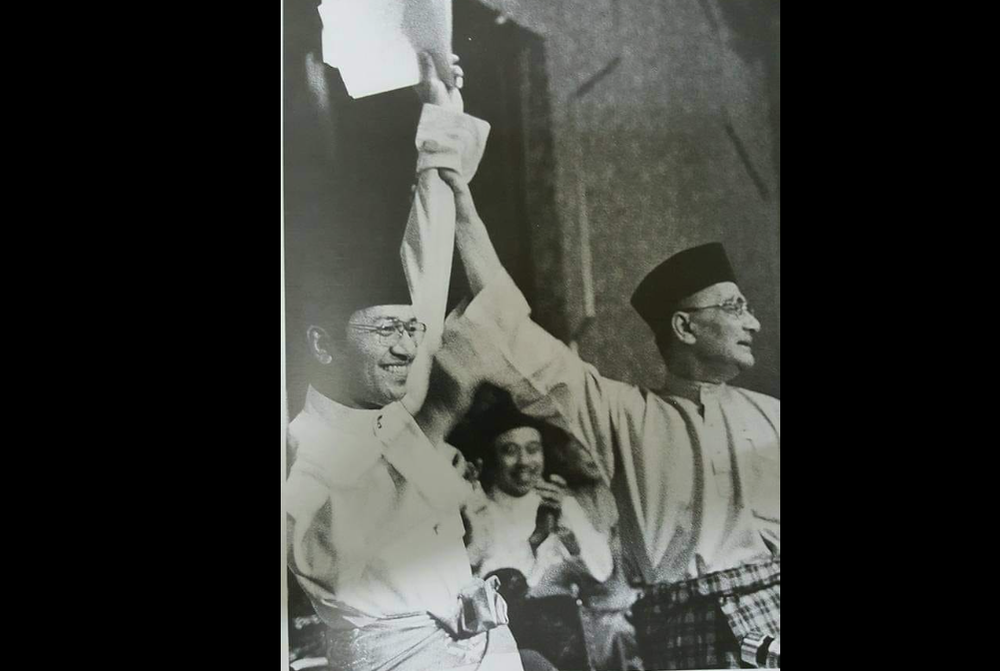
Tun Hussein Onn and Tun Dr. Mahathir (Source: Facebook)
Tun Dr. Mahathir bin Mohamad is a name that we Malaysians are familiar with. Most of us grew up during his reign as the 4th Prime Minister of Malaysia and were still around when he shocked the world by becoming the world's oldest serving state leader at the age of 92. However, his reign as both the 4th Prime Minister and 7th Prime Minister of Malaysia was marked with controversies. Here are 4 controversies that made headlines during his reign as 4th Prime Minister and you may have heard of them growing up:
1.Ops Lalang
Operation Lalang (or Ops Lalang in short) happened during Mahathir's reign as the 4th Prime Minister of Malaysia. It involves the arrest and detention of over 100 people without trial under the infamous Internal Security Act (ISA) in 1987. Those who were arrested include opposition politicians (notably Lim Kit Siang and Karpal Singh), NGO activists, students, artists, reporters and others. To add insult to injury, the curtailment of media freedom soon followed with Watan, Sin Chew Jit Poh and The Star had their publishing licenses revoked.
The official reason for Ops Lalang was reported to have been to “defuse racial tensions”. However, many have speculated that it was a way for then-Prime Minister Dr Mahathir bin Mohamad to remove his political opponents. In March 2023, Mahathir said that Ops Lalang was ordered by the police and not him; he stated that former inspector-general of police Tun Hanif Omar was the one who ordered the police to carry out Ops Lalang despite him (Dr Mahathir) refusing it. To this day, Dr Mahathir has not sincerely apologized for Ops Lalang.
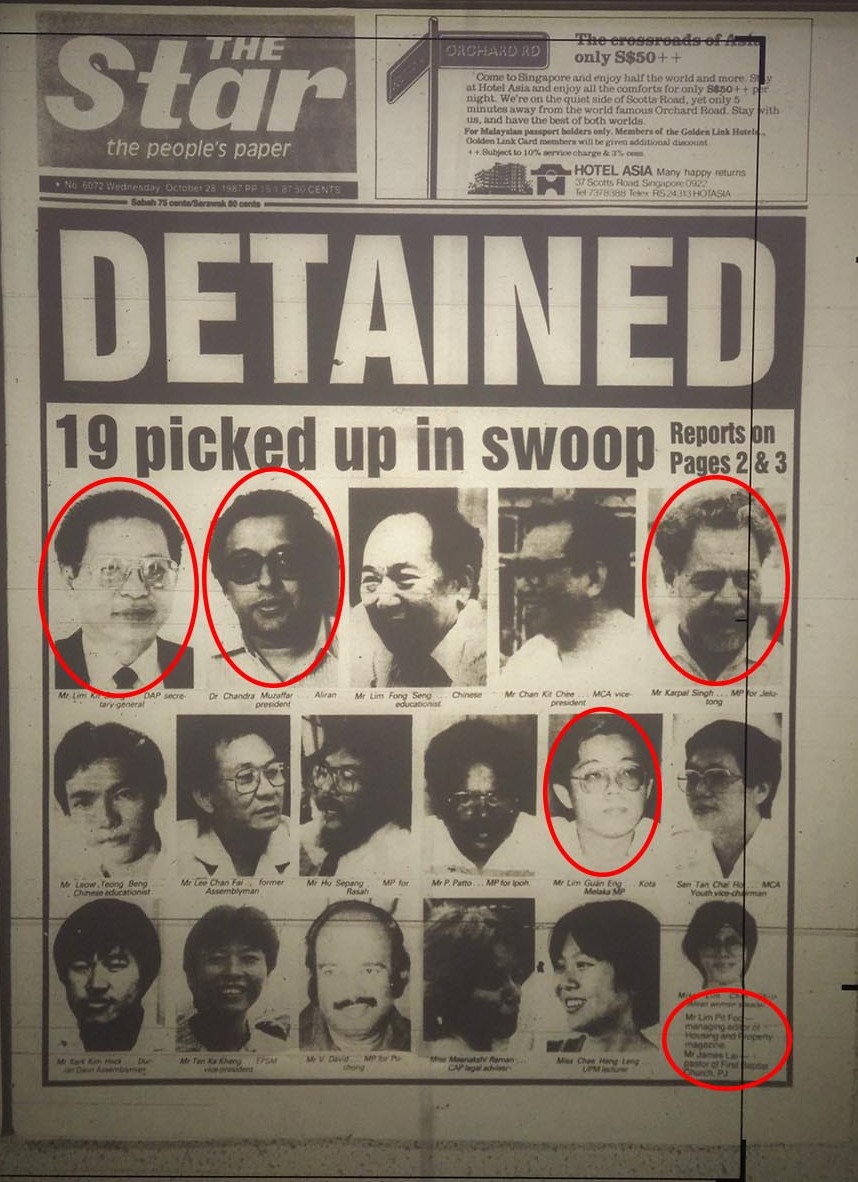
Those detained during Ops Lalang (Source: CILISOS)
2. Undermine royalty and the Gomez Incident
Back in 1983, Mahathir pushed through multiple amendments to the Federal Constitution; these included setting a 30-day limit for the Yang di-Pertuan Agong (YDPA in short) to veto a law (see Article 66[4A]) and limiting the right of YDPA to declare a state of emergency. These proposed amendments sought to reduce the power of the Malay rulers as consent from the royals was no longer necessary when it came to the enactment of laws. In the end, the monarchy settled with Mahathir's administration given that Mahathir was willing to compromise, the constitution was amended once again. This time restoring the King’s right to declare an emergency and giving him a total of 60 days to delay legislation.
Yet another constitutional crisis happened under Mahathir's reign as 4th PM, this time it involved the infamous Gomez Incident. The late Sultan Iskandar of Johor assaulted Douglas Gomez. The reason? Well, buckle up because it is a long story, it first began with the second son, Tunku Abdul Majid assaulting a Perak hockey goalkeeper after his team (Johor) lost to Perak. This attracted the attention of Parliament which pressured the Malaysian Hockey Federation to issue a five-year ban on the young prince, barring him from participating in national hockey competitions. This angered the late Sultan Iskandar of Johor who then pressured the state education department to boycott participation in national competition. The decision by the education department enraged Douglas Gomez who then called for the resignation of all Johor Hockey Association office bearers. Douglas Gomez's callout in turn angered the late Sultan who then invited him to the palace before physically assaulting him.
Mahathir used the Gomez Incident as a lever and sought to remove Malay rulers' immunity from prosecution and the ability to pardon themselves and their families. Mahathir succeeded as the changes in the constitution were implemented in March 1993 and sultans who violated the law could be prosecuted in a special court.
2. Undermine royalty and the Gomez Incident
Back in 1983, Mahathir pushed through multiple amendments to the Federal Constitution; these included setting a 30-day limit for the Yang di-Pertuan Agong (YDPA in short) to veto a law (see Article 66[4A]) and limiting the right of YDPA to declare a state of emergency. These proposed amendments sought to reduce the power of the Malay rulers as consent from the royals was no longer necessary when it came to the enactment of laws. In the end, the monarchy settled with Mahathir's administration given that Mahathir was willing to compromise, the constitution was amended once again. This time restoring the King’s right to declare an emergency and giving him a total of 60 days to delay legislation.
Yet another constitutional crisis happened under Mahathir's reign as 4th PM, this time it involved the infamous Gomez Incident. The late Sultan Iskandar of Johor assaulted Douglas Gomez. The reason? Well, buckle up because it is a long story, it first began with the second son, Tunku Abdul Majid assaulting a Perak hockey goalkeeper after his team (Johor) lost to Perak. This attracted the attention of Parliament which pressured the Malaysian Hockey Federation to issue a five-year ban on the young prince, barring him from participating in national hockey competitions. This angered the late Sultan Iskandar of Johor who then pressured the state education department to boycott participation in national competition. The decision by the education department enraged Douglas Gomez who then called for the resignation of all Johor Hockey Association office bearers. Douglas Gomez's callout in turn angered the late Sultan who then invited him to the palace before physically assaulting him.
Mahathir used the Gomez Incident as a lever and sought to remove Malay rulers' immunity from prosecution and the ability to pardon themselves and their families. Mahathir succeeded as the changes in the constitution were implemented in March 1993 and sultans who violated the law could be prosecuted in a special court.
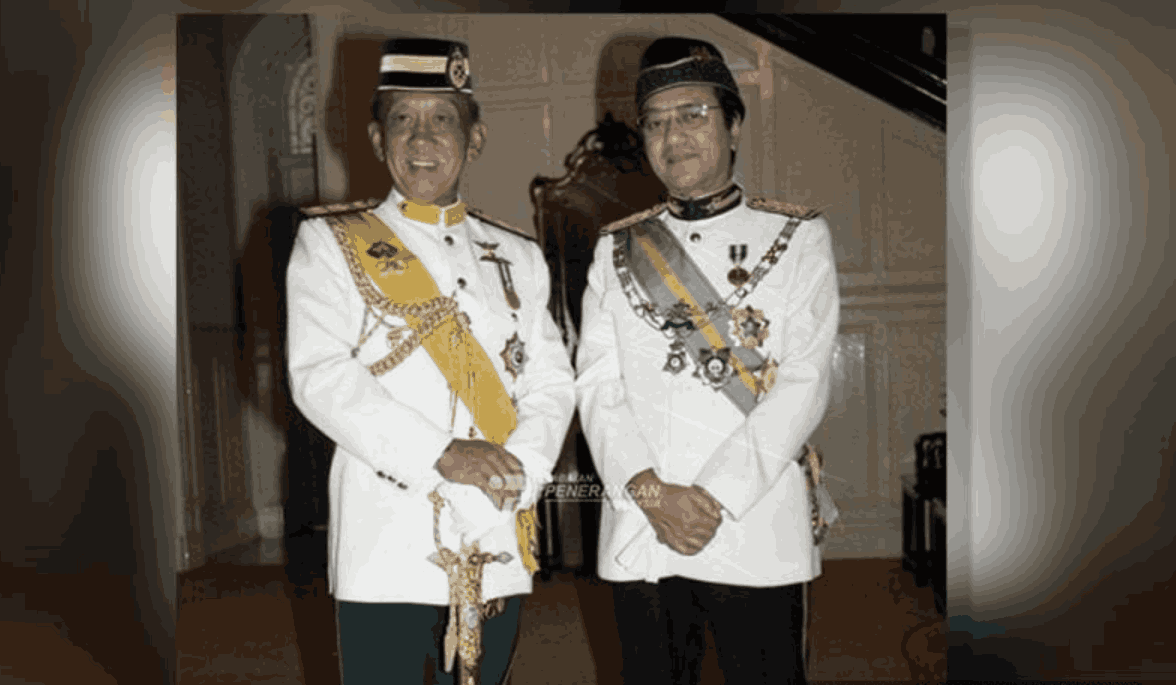
Mahathir with the late Sultan Iskandar of Johor (Source: malaysiakini)
3. His speech at the Organization of the Islamic Conference (2003)
Tun Dr. Mahathir bin Mohamad drew the ire of many foreign governments by making anti-Semitic remarks at the Organization of the Islamic Conference in 2003. He said the following:
"1.3 billion Muslims cannot be defeated by a few million Jews. There must be a way. And we can only find a way if we stop to think, to assess our weaknesses and our strength, to plan, to strategize and then to counter-attack.
We are actually very strong. 1.3 billion people cannot be simply wiped out. The Europeans killed six million Jews out of 12 million. But today the Jews rule this world by proxy. They get others to fight and die for them.
We are up against a people who think. They survived 2000 years of pogroms not by hitting back, but by thinking. They invented and successfully promoted Socialism, Communism, human rights and democracy so that persecuting them would appear to be wrong, so they may enjoy equal rights with others. With these they have now gained control of the most powerful countries and they, this tiny community, have become a world power. We cannot fight them through brawn alone. We must use our brains also."
His comments drew widespread condemnation from governments around the world. Some of his most vocal critics include the United States of America, Australia, Germany and Italy.
3. His speech at the Organization of the Islamic Conference (2003)
Tun Dr. Mahathir bin Mohamad drew the ire of many foreign governments by making anti-Semitic remarks at the Organization of the Islamic Conference in 2003. He said the following:
"1.3 billion Muslims cannot be defeated by a few million Jews. There must be a way. And we can only find a way if we stop to think, to assess our weaknesses and our strength, to plan, to strategize and then to counter-attack.
We are actually very strong. 1.3 billion people cannot be simply wiped out. The Europeans killed six million Jews out of 12 million. But today the Jews rule this world by proxy. They get others to fight and die for them.
We are up against a people who think. They survived 2000 years of pogroms not by hitting back, but by thinking. They invented and successfully promoted Socialism, Communism, human rights and democracy so that persecuting them would appear to be wrong, so they may enjoy equal rights with others. With these they have now gained control of the most powerful countries and they, this tiny community, have become a world power. We cannot fight them through brawn alone. We must use our brains also."
His comments drew widespread condemnation from governments around the world. Some of his most vocal critics include the United States of America, Australia, Germany and Italy.
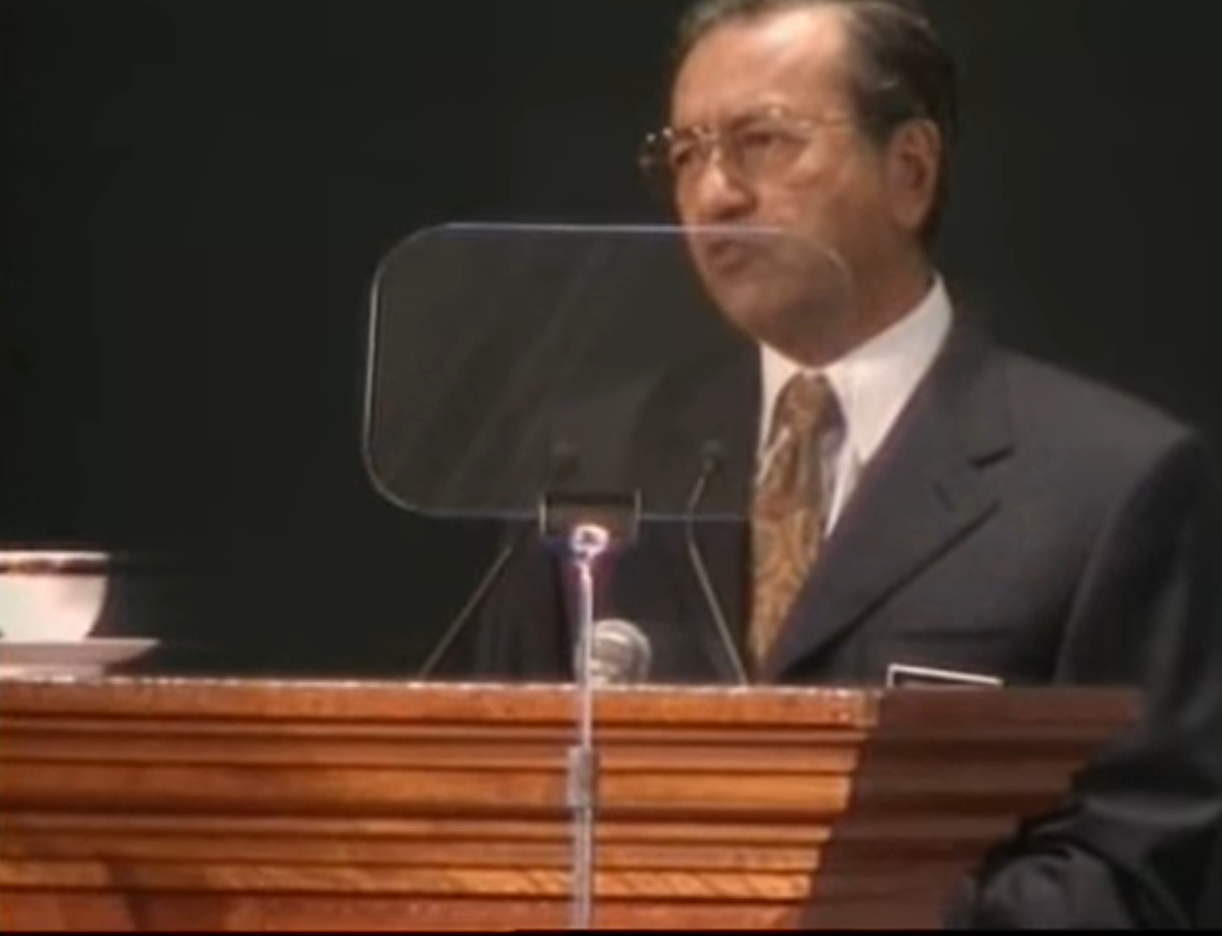
Mahathir at OIC 2003 (Source: AP Archive)
4. His sacking of then-Deputy Prime Minister Anwar Ibrahim
In the late 1990s, Malaysia's economy entered a depression. This in turn caused a split between Mahathir and then-Deputy Prime Minister and Finance Minister, Anwar Ibrahim (the current PMX). Anwar favored open markets and international investments which was in deep contrast to Mahathir's growing distrust of the west. Anwar also instituted an austerity package that reduced government spending by 18%, slashed ministerial salaries and deferred major projects. “Megaprojects”, despite being a cornerstone of Mahathir’s development strategy, were greatly curtailed.
Their conflict came to a head in 1998 which saw Anwar being sacked from his posts and arrested on charges of sodomy. According to Sydney Morning Herald, it was a "blatantly political fix-up"; the police Special Branch fabricated evidence (see semen-stained mattress) and coerced witnesses. Munawar Anees, the aide of Anwar whom Anwar was accused of sodomising, later wrote in The Wall Street Journal of his experience, “My detention by the Malaysian Special Branch taught me how it feels to be forcibly separated from one's wife and children. How it feels to be searched and seized, disallowed to make phone calls, handcuffed, blindfolded, stripped naked, endlessly interrogated, humiliated, drugged, deprived of sleep, and physically abused. What it's like to be threatened, blackmailed, hectored by police lawyers, brutalised to make a totally false confession.”. Anwar’s conviction and prison sentence ignited more protests under the Reformasi movement, which called for Mahathir’s resignation. Nevertheless, Mahathir continued to suppress Anwar’s supporters and consolidate his power.
4. His sacking of then-Deputy Prime Minister Anwar Ibrahim
In the late 1990s, Malaysia's economy entered a depression. This in turn caused a split between Mahathir and then-Deputy Prime Minister and Finance Minister, Anwar Ibrahim (the current PMX). Anwar favored open markets and international investments which was in deep contrast to Mahathir's growing distrust of the west. Anwar also instituted an austerity package that reduced government spending by 18%, slashed ministerial salaries and deferred major projects. “Megaprojects”, despite being a cornerstone of Mahathir’s development strategy, were greatly curtailed.
Their conflict came to a head in 1998 which saw Anwar being sacked from his posts and arrested on charges of sodomy. According to Sydney Morning Herald, it was a "blatantly political fix-up"; the police Special Branch fabricated evidence (see semen-stained mattress) and coerced witnesses. Munawar Anees, the aide of Anwar whom Anwar was accused of sodomising, later wrote in The Wall Street Journal of his experience, “My detention by the Malaysian Special Branch taught me how it feels to be forcibly separated from one's wife and children. How it feels to be searched and seized, disallowed to make phone calls, handcuffed, blindfolded, stripped naked, endlessly interrogated, humiliated, drugged, deprived of sleep, and physically abused. What it's like to be threatened, blackmailed, hectored by police lawyers, brutalised to make a totally false confession.”. Anwar’s conviction and prison sentence ignited more protests under the Reformasi movement, which called for Mahathir’s resignation. Nevertheless, Mahathir continued to suppress Anwar’s supporters and consolidate his power.
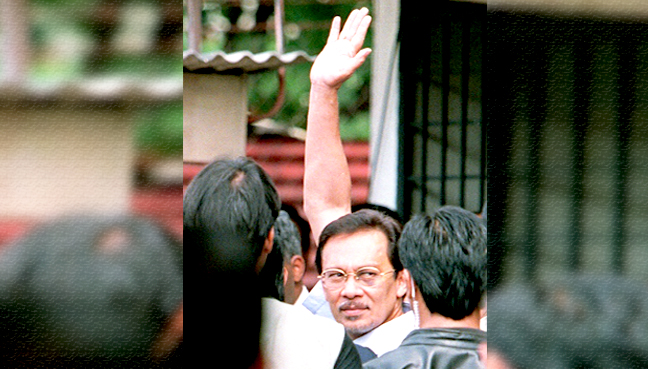
Anwar with a blackened left eye (Source: FMT)
These are all incidents we may have read about or heard of when we were growing up in Malaysia. Perhaps, Malaysian youths these days wouldn't remember it as they weren't there but for those of us who have witnessed it, it shall be forever engraved in our minds. Tun Dr. Mahathir bin Mohamad once said, “Melayu mudah lupa” but fortunately for us all, “bangsa Malaysia tidak mudah lupa”.
These are all incidents we may have read about or heard of when we were growing up in Malaysia. Perhaps, Malaysian youths these days wouldn't remember it as they weren't there but for those of us who have witnessed it, it shall be forever engraved in our minds. Tun Dr. Mahathir bin Mohamad once said, “Melayu mudah lupa” but fortunately for us all, “bangsa Malaysia tidak mudah lupa”.
No comments:
Post a Comment